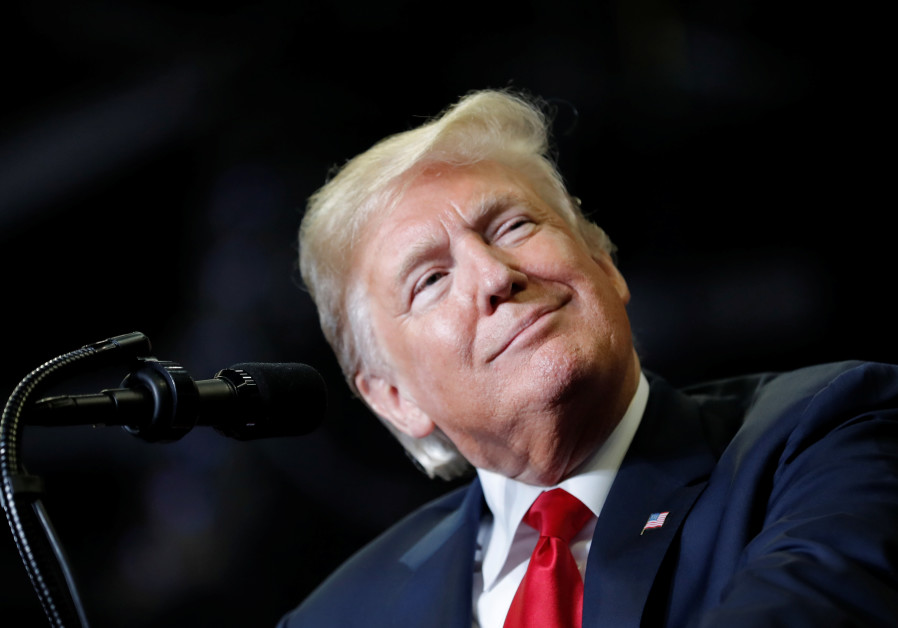Trump’s peace plan for Israel-Palestinian conflict facing more delays

U.S. President Donald Trump speaks at a campaign rally on the eve of the U.S. mid-term elections. (photo credit: REUTERS/CARLOS BARRIA)
WASHINGTON – The Trump administration plans to unveil its long-awaited peace plan in February, but may slide its release to March or April as it trains new staff on a growing team dedicated to the coming diplomatic effort, according to US officials familiar with the matter.
Publication of the plan – a project that is two years in the making, led by US President Donald Trump’s son-in-law, Jared Kushner, and his longtime attorney and adviser, Jason Greenblatt – has faced repeated delays. Members of the tight-knit peace team bristled at timetables and deadlines, but now privately admit that their timing will never be perfect for the launch of a fresh peace process reliant on participation of Israelis, Palestinians and Arabs navigating their own complex politics.
The team has given up on the belief that the Palestinians will come to the table of their own accord, without first viewing the contents of the plan first. For several months after Trump recognized Jerusalem as Israel’s capital a year ago, Kushner and Greenblatt expressed hope that Palestinian Authority leaders might simply need time to vent their frustrations, only to come back around.
That has not happened, leading the team to believe that they will need significant regional buy-in.
Kushner is said to be aiming for a February release, but one source briefed on the strategic plan said he expects the plan to launch no earlier than March.
In September, at the UN General Assembly in New York, Trump told reporters he wanted the peace process to start within two to four months. His aides have now dropped that language and admit that the outer limits of Trump’s timeline will not be met.
A White House official cautioned The Jerusalem Post that the team remains flexible and has no date set in stone, and that acknowledging events outside of their control might continue to impact the timeline.
One such event already contributed to the disruption of the team’s plans: The brutal murder of Jamal Khashoggi, a Saudi dissident, journalist and US resident, by Saudi officials at their consulate in Turkey.
Kushner is relying on Saudi crown prince Muhammed bin Salman – believed complicit in the killing – to legitimize his peace initiative, to help bring Palestinians back to the table and potentially splinter off a separate line of talks on normalizing Israeli-Saudi relations.
But no party in the region is eager for this process to start. The Palestinians continue to dismiss the Trump administration as an honest broker, and prime minister Benjamin Netanyahu is reportedly wary of any process that will require him to give in to significant concessions ahead of next year’s elections.
And a new Congress, with Democrats in control of the House of Representatives, presents additional challenges to the peace team. Democrats on the House Foreign Affairs Committee have privately told Kushner they will oppose the plan if it does not explicitly support a two-state solution.
In public and in private, Kushner has responded to this question by claiming the concept of a state “means different things to different people.” Trump endorsed “two states” at the UN General Assembly in September, but did not elaborate on his administration’s vision.
The strategic rollout was discussed in a meeting with Trump, Kushner, Greenblatt and David Friedman, the US ambassador to Israel, in the Oval Office last month.
“Our timing, our strategy and our messaging is and will be entirely our own,” Friedman said after the meeting, responding to reports that the discussion resulted in yet another delay.
Reports have emerged that Friedman, Greenblatt and Kushner internally disagree on timing and certain elements of the plan – a series of rumors that all three men deny.
“We intend to release the president’s vision,” Friedman continued, “when the administration concludes that we have maximized its potential for acceptance, execution and implementation.”
Join Jerusalem Post Premium Plus now for just $5 and upgrade your experience with an ads-free website and exclusive content. Click here>>






Comments are closed.